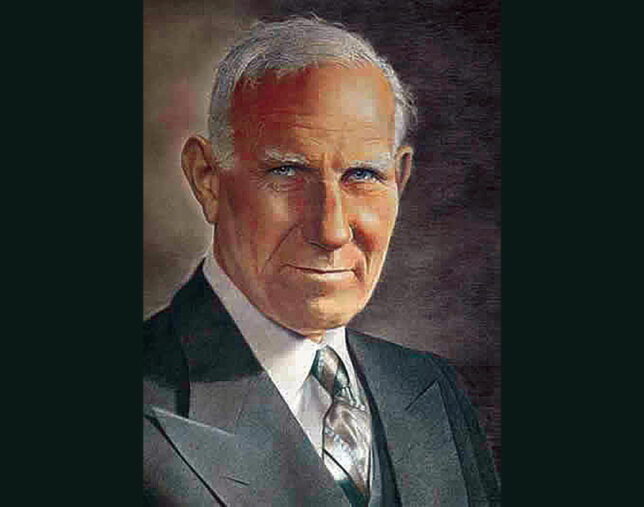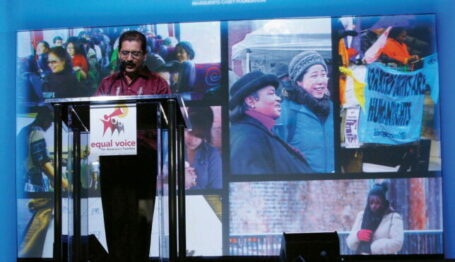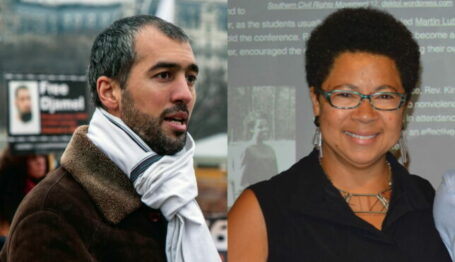Foundation Watch
The Marguerite Casey Foundation: “Social Justice Philanthropy”
Big Philanthropy’s Most Radical Foundation?
 The Marguerite Casey Foundation is part of a family of philanthropies linked to UPS founder James E. Casey. Credit: DOL. Public domain.
The Marguerite Casey Foundation is part of a family of philanthropies linked to UPS founder James E. Casey. Credit: DOL. Public domain.

The Marguerite Casey Foundation: Big Philanthropy’s Most Radical Foundation? (full series)
“Social Justice Philanthropy” | A Focus on Group Identity
Left-Wing Grantmaking | Thoughts and Questions
Summary: Big Philanthropy is often rightly criticized for the large share of its grantmaking that supports activism and public policy advocacy, necessarily at the expense of funding for the traditional charitable causes. But what happens when a major foundation decides to abandon traditional charity in favor of bankrolling efforts to fundamentally reshape American society and politics to suit its own ideological priorities—priorities at the spectrum’s leftmost wing. Enter the Marguerite Casey Foundation—one of the most radical major grantmaking foundations in the United States.
Big Philanthropy is often rightly criticized for the large share of its grantmaking that supports activism and public policy advocacy, necessarily at the expense of funding for the traditional charitable causes that most Americans would personally associate with the word “philanthropy.” This is related to (and exacerbated by) Big Philanthropy’s distinctly left-leaning ideological bias, which ensures that the specifics of what it does fund tend to be controversial and politically divisive—descriptors that few would apply to their personal understanding of charitable giving.
These are broad generalizations, applicable to varying degrees in many cases and inapplicable entirely in others. But what happens when a major foundation decides to fully embrace both trends—all but abandoning traditional charity in favor of bankrolling efforts to fundamentally reshape American society and politics to suit its own ideological priorities, while situating those priorities at the spectrum’s leftmost wing? What does this say about the nature of the “charitable” philanthropy we have collectively incentivized through the tax code? The Marguerite Casey Foundation—one of the most radical major grantmaking foundations in the United States—provides a case study for just such questions.
“Social Justice Philanthropy”
The Marguerite Casey Foundation is part of a family of philanthropies linked to UPS founder James E. Casey, which also include the Annie E. Casey Foundation and Casey Family Programs. Capital Research Center senior fellow, the late Martin Morse Wooster, examined James E. Casey’s philanthropic legacy in detail. Named in honor of James’s sister, the Marguerite Casey Foundation was spun off from Casey Family Programs in 2001. By the following year, it had been seeded with a nearly $600 million endowment. Its most recent tax filings are from 2022, when it reported approximately $800 million in total net assets.
As of early 2023, the Marguerite Casey Foundation claimed to have disbursed over $615 million since its establishment, which makes it a significant, though not massive, grantmaker. For context, in 2022 its total expenses (including grants) were roughly equivalent to those of the Lynde and Harry Bradley Foundation, one of the largest and most prominent conservative private foundations in the country. This alone illustrates the lopsided ideological distribution of philanthropic resources in the United States. While the Marguerite Casey Foundation spent as much money in 2022 as one of the very top conservative foundations, when measured on the entirely different scale of the philanthropic Left, it falls well behind some truly behemoth funders. That year, the Hewlett Foundation’s grantmaking alone was approximately 12 times larger, while the Ford Foundation’s was more than 16 times larger.
Ford and Hewlett are themselves thoroughly politicized, funneling hundreds of millions of dollars to the activist Left every year. But the Marguerite Casey Foundation is conspicuous even among its philanthropic peers for just how comprehensively it appears to have embraced its role as a font for left-wing sociopolitical engineering. It describes itself as a “racial and economic justice funder” that is “intentional and vigilant about identifying and undoing racism and white supremacy, on every level.” In practice, the foundation appears to favor some form of socialism based on identity politics, and it has directed much of its grantmaking toward individuals and groups agitating to make this happen.
It is impossible to examine the Marguerite Casey Foundation’s activities without considering the influence of its president and chief executive officer Carmen Rojas, a Fulbright Scholar whom Inside Philanthropy has dubbed one of the 50 most powerful women in philanthropy. Rojas has led the foundation since 2020, prior to which she headed a group called the Workers Lab, which remains a significant Marguerite Casey Foundation grantee. Rojas’s predecessor as the foundation’s president and CEO—Luz Vega-Marquis—currently sits on The Workers Lab’s board of directors.
Rojas brought to the Marguerite Casey Foundation an especially radical approach to philanthropy, one that embraces a concept that she has called “social justice philanthropy.” She believes that private foundations should openly favor an identifiably left-wing vision for how society and government should operate and that their grantmaking should be directed at bringing this vision to fruition. Rojas has written that “philanthropy needs to use its economic resources to change the economic rules” and should consciously work “to make bold changes that shift the balance of power in our society.” More specifically, she wants foundations to “hyper-focus” on funding “organizers, activists, and scholars to fight for a representative multiracial democracy, just economy, and a planet that is treated as sacred.”
While her commitment to supporting left-wing sociopolitical activism is clear, other aspects of Rojas’s philanthropic philosophy are rather less so. For instance, in 2021 she told Inside Philanthropy that her ultimate goal is a future in which foundations no longer need to exist, but at the same time has also written that “a strong civil society is the antidote to authoritarianism, and as foundations, our core purpose is to resource and bolster civil society.” These would appear on their face to be irreconcilably contradictory positions. Rojas has also been highly critical of conservative activists and donors for allegedly “attempting to shape our democracy to match their preferences and what they deem acceptable”—a charge that could fairly be leveled against virtually everything that the Marguerite Casey Foundation does.
The foundation’s board of directors features several nationally prominent Democratic politicians and left-wing nonprofit executives. Board members include Democratic Party activist and two-time unsuccessful Georgia gubernatorial candidate Stacey Abrams, Obama Administration Secretary of Housing and Urban Development Julian Castro, Color of Change president and defund-the-police supporter Rashad Robinson, Inner-City Muslim Action Network executive director Rami Nashashibi, and Mijente executive director Marisa Franco. The foundation’s board chair is New York City-based investment manager Ian Fuller, who also serves on the boards of Color of Change, the Workers Lab, the Proteus Action League, the anti-police activist group Common Justice, and the major left-of-center grantmaking conduit Amalgamated Charitable Foundation.
In 2021, the foundation set up the Marguerite Casey Action Fund, a 501(c)(4) social welfare organization with a mission to “develop and advocate for legislation, regulations, and government programs.” Rojas is also listed as the group’s president and CEO. The Marguerite Casey Action Fund had total revenues of $950,000 in 2022, and its sole identifiable funder is the Inatai Foundation, a multi-billion dollar 501(c)(4) grantmaker that was created from the sale of Washington-based Group Health Cooperative to Kaiser Permanente in 2017. In 2022, the Marguerite Casey Action Fund spent $277,500 on an “anti-racist CEO group” for foundation executives working to “develop a common agenda in service of supporting organizations building a just and equitable society.”
In the next installment, the Marguerite Casey Foundation focuses on group identity.



